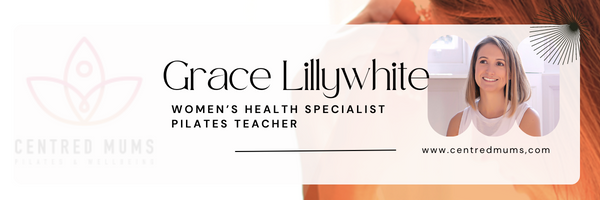Here are Grace’s top five facts you need to know for good pelvic floor health during the fourth trimester:
1: Whatever birth you had, your pelvic floor needs recovery time.
It is really important that you take the time to rest and not stand/walk excessive amounts in the early stages – really listen to your body. I love the 777 rule ‘7 days in the bed.
7 days on the bed, 7 days around the bed’, which encourages deep rest in those first few weeks. If you feel any heaviness/strain in your pelvic area, rest and allow it to recover. Your body has been through a lot and it needs time. While gentle movement is great, there is no hurry and everyone’s timeline is different.
It’s also important to understand that abdominal births don’t exclude you from pelvic floor problems further down the line so don’t assume that you can ignore your pelvic floor health if you didn’t birth vaginally (referenced here).. Call in as much help as you can, especially if you have older children that need lifting etc.
2: It’s not just about kegels (pelvic floor squeezes)
in these early stages, doing the squeezes your midwife has likely suggested can be a helpful way to active the pelvic floor muscles but the best way to strengthen your pelvic floor is to take a holistic approach. Your breathing patterns and movement are key. When you breathe out, your pelvic floor naturally moves upwards and contracts.
When you breathe in it moves down and lengthens. If your ribcage isn’t moving enough you can end up putting too much pressure into the pelvic floor. Put your hands on either side of your ribs and try to breathe into them to reduce the pressure going downwards. When you pick up your baby, breathe out to reduce the pressure going downwards.
Move little and often – stay at home for the first few weeks but try to gently walk around as much as is comfortable and gradually build up to be out of the house and walking etc. Gentle strengthening exercises like glute bridges and leg slides (exhaling as you extend the leg) are great ways to gently activate your core muscles.
You can learn more about how breathing and posture impact your pelvic floor in the video below.
3: Toilet habits matter
If you are straining to go to the toilet due to constipation (which is common in pregnancy and the early postnatal phase) you are putting extra pressure on your pelvic floor.
Do everything you can to reduce this – elevate your feet while poo-ing, use a squatty potty, make sure you are drinking enough (especially if breastfeeding) and discuss laxatives with your health care provider if you feel they are needed. You can learn more in the video link below.
4: What symptoms are a sign of pelvic floor dysfunction?
Pelvic floor dysfunction can present in a variety of ways – it’s not just about wetting yourself. If your pelvic floor is struggling, you could experience a range of symptoms including urinary and faecal incontinence, pelvic pain, pressure/bulging/dragging/‘bubble’ feeling in the vaginal area, and difficulty with bowel movements.
All of these issues should not be ignored, even in the early days. At your postnatal check, push for a GP referral to a women’s health physio if you have any concerns or use the squeezyapp website (https://squeezyapp.com/directory/) to find a private specialist physio near you. I cannot emphasis enough how much seeing a women’s health physio can change your life!
I highly recommend it to anyone who has had a baby, even if you experience no symptoms – remember it’s not just about now – by looking after yourself in the postnatal period you are setting yourself up for the rest of your life. This is particularly important if you are having babies over the age of 35 as us ‘older mums’ are also starting to experience the hormonal changes of perimenopause and so this becomes even more important.
5: How you treat your body now will impact you both now and for the rest of your life!
There is evidence that shows a link between pelvic floor health and mental health in the early days postnatally and I believe that this is true at all stages – if you are not able to leave the house without wetting yourself, it is difficult to be confident and secure in your body, whatever life phase you are at.
Maintaining pelvic floor health can significantly affect a woman’s overall physical and emotional well-being and we need to start taking it seriously and stop brushing it under the carpet. Addressing pelvic floor issues can lead to improved bodily function, confidence, and quality of life so please do invest in your pelvic floor and know that you can do SO MUCH to improve your pelvic floor health.
Ignoring symptoms or not giving it adequate care and attention could lead to much bigger problems further down the line. Do reach out if you are feeling like you need support, I will always be able to refer you to someone and help you on the road to feeling on top of your pelvic floor!
Expert Advice & Guidance
If you enjoyed learning about this topic, the PregnaHub® app is full of mind and body supporting activities, expert advice and classes. We are here for you every step of the way!
PregnaHub® app
About the author:
I am the founder of Centred Mums; pelvic floor specialist Pilates classes in St. Albans and online. I work with mums to improve their pelvic floor and core function with an evidence based, holistic approach that gets results fast.
Website: centredmums.com
Instagram: @centredmumspilates
















